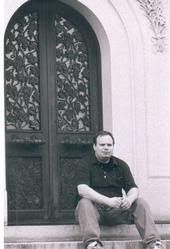I've never cared for the term "re-imagining," especially since it's usually applied to subpar remakes of films that were often mediocre to begin with, but it's an apt description for George Romero's 2008 film DIARY OF THE DEAD. Romero essentially starts anew, taking another look at the beginnings of his now-legendary zombie outbreak through the filters of various camera lenses and cathode ray tubes.
Perhaps it was the lingering resentment over the slick, name-ridden LAND OF THE DEAD or the unfortunate timing of being released shortly after the similarly-styled CLOVERFIELD, but it seemed as if critics and audiences alike had written off DIARY sight unseen. I myself went in with considerable trepidation, expecting the same warmed-over undead pap that made up LAND.
Call it the power of lowered expectations if you want, but DIARY OF THE DEAD is a solid film.
Right from its opening scene, in which a news crew captures the early stages of the outbreak, Romero recreates the same ominous, apocalyptic feel of the original trilogy, effectively rinsing away any residual traces of LAND. I've stated here before that my favorite part of end-of-the-world zombie films is the beginning of the end, so to speak, as the characters start to realize that something's going seriously wrong. Romero not only nails the sense of impending dread, but he sets it up in the confines of a video-bound student film (that would no doubt have gotten skewered on this very blog). It's a clever, if somewhat thrown away, contrast between fictional horrors and "real" ones, but it also gives Romero a chance to chime in on the fast-vs.slow-zombie debate, which he does with a fair amount of bite.
What I found curious was how much the dissidents berated Romero for using the faux-documentary approach, as if the technique were the sole property of CANNIBAL HOLOCAUST or THE BLAIR WITCH PROJECT. (That'd be like fans of Stoker's DRACULA saying novels can no longer be written in epistolary format.) It's simply a storytelling method, one that Romero uses to reinforce the theme of media and its impact on reality. There's never a moment where it doesn't feel like a work of fiction, and sometimes the format calls for some awkward blocking to get the action, but it's far from the deal breaker critics make it out to be.
Story-wise, Romero doesn't take us anywhere we haven't already been, but with the father of the modern cinematic zombie at the helm it makes for a worthwhile journey. Memorable set-pieces include an abandoned/emptied hospital that recalls the RESIDENT EVIL games (bringing its stylistic influence full circle) and an all-too-brief appearance by a mute Amish farmer (a resurgence of Romero's often-overlooked black humor). There are a couple of slow spots along the way--the sequence involving the black survivalists could've had a lot more tension, feeling more like an potential obstacle that's easily brushed past, and the military-as-reckless-assholes scene bored me as soon as it started (Romero mined this area well in DAY OF THE DEAD, but aside from Brian Keene's novel THE RISING, it's since fallen into tired cliche; at least Romero keeps the moment brief)--but DIARY moves at a brisk clip, incorporating several scenes of action and/or scares without sacrificing its flow. But it's the film's third act, in a fortress-like home equipped with an oh-so-appropriate panic room filled with video monitors, when Romero really takes the character-POV structure as his own, using a multiple-camera approach to goose what could've been just another ho-hum climax.
Much has already been written about Romero's criticism of 24-hour information sources and online communities like YouTube and MySpace, though they're more extensions of Romero's commentary of a technology-dominant society than the overall message. (Odd, that those who called DIARY a rip-off of CANNIBAL HOLOCAUST failed to mention that both films use their documentary-esque format to illustrate how the media can manipulate the truth to one's best interest.) But most of the movie's contempt--and, presumably, the bulk of Romero's ire--is for the character of Jason, who films the majority of DIARY's events; more than once he's condemned for his willingness to stay safely behind the camera lens and "document" the mounting horror than become an active participant in his group's survival. I wonder how potent this would've been during the mid-'90s, when the "If it bleeds, it leads" style of journalism was at its peak.
A sequel to DIARY is supposedly already in the works, and as much as I enjoyed seeing Romero's world through his protagonists' eyes, I really don't think one's warranted. Granted, it's possible Romero may have something new to bring to the equation, but considering the first (or is that fifth?) film's reception, and the seeming ambivalence of his zombies in general anymore, it may be wise to slap the lens cap back on.
Sunday, July 6, 2008
Subscribe to:
Post Comments (Atom)

No comments:
Post a Comment